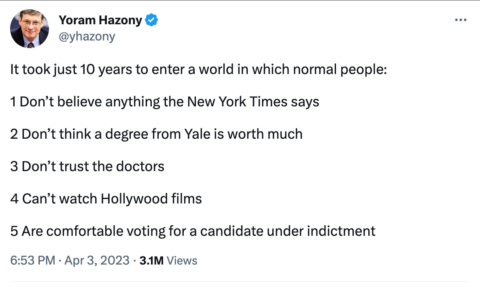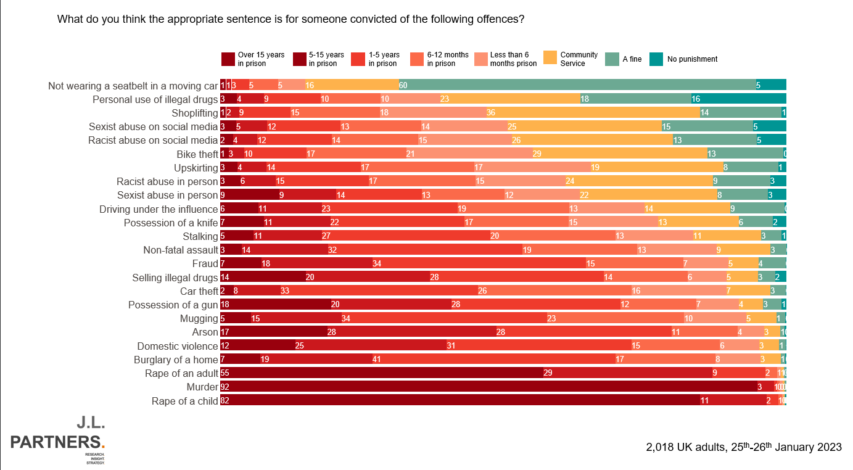Not following the news closely, I don’t think I’d heard of “Mizzy” until perhaps a week or two back, but if he’d tried pulling this kind of behaviour in the US, his career would likely have been a lot shorter and much more violent:
What’s the big deal about Mizzy? Surely one idiot 18 year old doesn’t merit the full glare of the British media, you may be thinking (at least if you haven’t been paying attention). Certainly the Guardian didn’t seem to think so — lagging two days behind reporting of the story in the Daily Mail, Telegraph, Independent and BBC. We at the Critic were kind enough to point this out and the Guardian have since seen fit to lower themselves to the story — an unhelpful distraction no doubt from more serious stories their exhaustive coverage of Philip Schofield’s departure from British breakfast TV.
One reason to care, is that despite claims to be a mere prankster, Mizzy’s actions are profoundly serious, terrifying to his victims, and suggest an escalating pattern of behaviour that could very plausibly lead to greater crimes. In a series of videos clearly intended to menace his targets, he decided to steal a dog from an old lady, burst into the home of a young family, and, in one truly shocking incident, comes up to a woman alone at night and asks her if she wants to die. It’s obvious, taken together, that these incidents are not pranks taken too far, but deliberate and calculated attempts to terrify and intimidate innocent people, often women, children or the elderly.
Anyone who has been subject to what we often euphemistically call “anti-social behaviour” and middle class columnists like to frame as teenagers with “too little to do” (blame the closed youth centre or something), knows all too well what Mizzy is up to. It’s the local drug addict who always follows you late at night, leering. It’s the teenagers who let their pitbull bark and snarl at you, smirking all the while. It’s the men who sit outside your house drinking, and stare at you as you walk down the road. Men and boys who take pleasure in the fear of others, often to compensate for absences in their own life — a job, a father, a girlfriend, a future. And sometimes the absence has no obvious explanation — there’s just something missing inside, a hole that demands to be filled, an appetite for brutality and cruelty muzzled but not tamed by modern society.
So what’s so special about Mizzy? He’s got a TikTok channel, on which he proudly posts these petty acts of barbarity for the pleasure of his thousands of followers. And this fact tells a story, an important story, about both the present and future of British society.
In the present, it’s a tale of an unpoliced and anti-social public realm; an increasingly familiar and despairing story of police and judicial passivity in the face of open criminality. Under Blair we reclassified petty crime as “anti-social behaviour” and instead of prison, or a suspended sentence and an ankle monitor, judges handed down things along the lines of “you must not be in the East Shield shopping centre after 10pm”. ASBO recipients, having been briefly hauled up, generally swiftly resume their trajectory towards criminality, creating more victims in the process.
Mizzy, having spent months openly terrorising people, was, amidst national attention and outrage, given the successor to the ASBO — a CBO (Criminal Behaviour Order). Shortly after appearing on national TV and complaining that he was the victim of racism, and only two days after receiving his CBO, Mizzy had already breached its terms, having posted yet more videos.
So much for the present — but what does the tiresome tale of narcissism and cruelty tell us about our future? Nothing good. Mizzy has blended street thuggery with online harassment, creating entertainment out of fear and pain. He’s part of a new flamboyant and triumphalist form of bullying and criminality, which finds an enthusiastic audience online.
Joe Baron instantly recognized Mizzy’s type from his own experiences as a teacher:
Piers Morgan is right. Mizzy is a moron. For those of you unfamiliar with the story, “Mizzy” is 18-year-old Bacari-Bronze O’Garro, who attracts followers on TikTok by filming himself engaged in criminal activity. He terrifies families by invading their homes, steals the dogs of elderly women, physically assaults unsuspecting commuters, and threateningly asks random people if they’d like to die.
[…]
As a teacher I recognised him immediately. So many youngsters betray the same peculiarities: entitled, self-satisfied and utterly irresponsible.
Why are these traits so commonplace among our young people? There are several reasons, bad parenting being the most notable. Either through fear or convenience, parents no longer discipline their children. If a teacher attempts to do so, the parents often complain, presumably in a bid to appease their volatile offspring and maintain a quiet life at home.
This month, I had a furious encounter with a parent who could only be described as deranged. My crime: issuing her daughter with a 30-minute detention for forgetting her exercise book. In an earlier incident, another parent physically assaulted a colleague, attempting to strangle him for disciplining his daughter. She had slapped a book out of his hand during classroom changeover. Anxious and stressed, my colleague left the school soon after, and several weeks later, his attacker’s daughter viciously assaulted another pupil, who then needed hospital treatment.
Parents also have to take responsibility for the devastating effects of divorce on their children. Nearly half of all marriages end in failure. That’s a huge number of broken homes and broken children. And it often leads to poor behaviour. Fecklessness begets fecklessness. When will we wake up to this reality and encourage prospective parents to take their vows more seriously? That’s if there is a marriage in the first place. Or even a father present in the home.
Furthermore, adults have surrendered their authority to children. For example, recalcitrant pupils are not effectively disciplined because, contrary to the Christian doctrine of Original Sin, children are now seen as pure, infallible and morally unimpeachable, and adults as iniquitous and corrupting influences. Consequently, a child’s misbehaviour must be the fault of the adult or teacher. In addition, if a child should make a statement concerning an incident, and the statement contradicts his or her teacher’s version of events, the child’s claims must take precedence, even if they’re completely bogus.
















